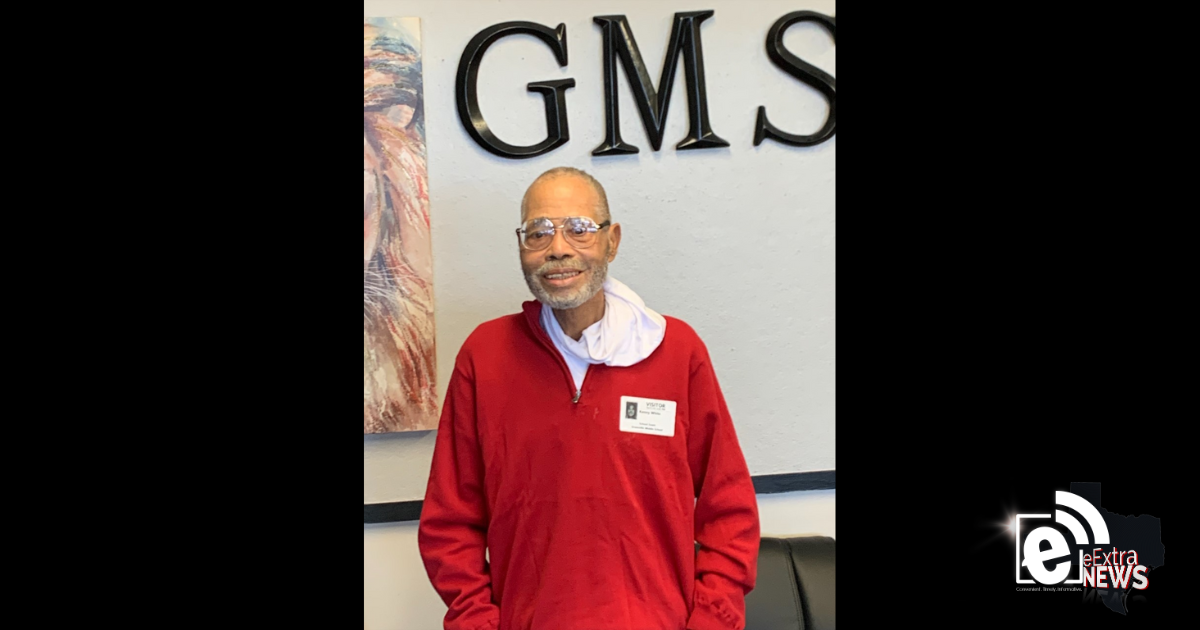First black graduate of GHS comes back to visit for homecoming || Content sponsored by Quality Care ER

Photo: Submitted
Kenny White Jr., Class of 1964, and 25 of his children and grandchildren recently gathered in Greenville to attend the Homecoming game.
Mr. White drove over from Dallas a little early so he could tour the Greenville Middle School building, which is where he made history as the first black graduate of Greenville High School.
“I am so proud to say I was the first black graduate from the school,” he said. “Greenville is the place I feel more connected than any other place I’ve lived.”
Mr. White worked for the Dallas Police Department for more than 50 years in the property evidence room, and he supervised the evidence room at the Greenville Police Department for seven years, he recalled.
Thinking back on his time at the old Greenville High School, he fondly remembers lettering in track and also playing shortstop on the baseball team.
While he was in Greenville, Mr. White was frequently interviewed by local media. Below is a story written in 2014 by Brad Kellar of the Greenville Herald-Banner:
Kenny White had no idea as he walked along Wellington Street that morning more than 50 years ago that a chance meeting with some kind strangers would result in his becoming a part of Greenville’s history.
In 1964, White became the first black student to graduate from what had been the previously segregated Greenville High School. White had an opportunity recently to relive those days, as he toured his former neighborhood, and he attributed the opportunity to efforts of individuals who had fought for desegregation.
“I was just the benefactor of what had already been done,” White said.
History records the 1964 Civil Rights Act prohibited discrimination in voting, education, and the use of public facilities.
None of that was on White’s mind on the first day of the fall semester in 1963. His family had moved to Greenville a few weeks before, and lived in a house which once stood well behind the Veterans of Foreign Wars Post, at what would now be the far western end of Ridgecrest Road.
“There was nothing around there at that time but fields and trees,” White, 68, recalled.
He was scheduled to enroll at Carver High School, which is now the LP Waters Early Childhood Center. At the time, Carver was still where most black students attended high school in Greenville. Baby steps toward integration had begun and White said a handful of black students were enrolled at Greenville High School as underclassmen.
White said he simply wanted to finish his senior year and graduate.
“It really didn’t make much difference whether it was from Carver or over there,” White said. Having just arrived in Greenville, he didn’t even know where the high school was located.
So when White reached Wellington Street, he turned north, intending to continue to Lee Street and turn west to reach Carver, a journey of more than two miles.
As he approached the intersection of Wellington and Cornelia streets, he encountered a group of students who were on their way to Greenville High School. White remembered they asked why he was walking all that way to Carver, when he could just attend the high school a couple blocks away.
White realized he didn’t have an answer, shrugged his shoulders and agreed to accompany them.
“They were very kind,” he said. “I remember they waited and watched to make sure I went in the right door.”
In short order, White made it to his first class as a senior at Greenville High School. There was no big fuss made over his enrolling at the campus, when he was expected to register at Carver.
“There was so much other stuff going on, I don’t think they paid much attention to me,” he said. “Me going there just added to the handful.”
White said he got along with most of his classmates, white or black. He would occasionally overhear the use of what would now be considered offensive terms or language by the white students.
“It was not a problem with me,” White said, explaining how the white students were not used to the situation either. “It was as new to them as it was to me. What they actually did was apologize. It wasn’t anything derogatory. I was just trying to get out of high school.”
He excelled at athletics.
“I was in the paper every week,” White said, most notably for his achievements in track. He also played baseball, but he was unable to sign up for the football or basketball teams, as they were not yet mixed. “They said I was ineligible.”
White noted he received a good education and had great teachers.
“I really can’t think of anything negative,” he said. “They were supportive and they always seemed to want me to do better.”
White didn’t have many friends at the school, but he didn’t mind as he was concentrating on his education.
“I wasn’t really an outgoing person anyway,” he said.
White did have a good friend in Thomas Williams, who had a car and would occasionally drive him home. Even though Greenville High School was half the distance from his house as Carver, White appreciated the lift.
“I still walked to and from school about 90 percent of the time,” he said.
White remembered there was an issue with the Senior Prom, when the high school principal at the time made an announcement. The black students would be allowed to attend.
“But he told us we couldn’t bring any dates that didn’t go to school there,” White said. “That was OK for me, because I didn’t know anyone there anyway.”
He recalled how Carver High School was hosting its own prom the same night, which he and Williams attended.
“We probably would have ended up there anyway,” White said with a chuckle.
White said his mother moved away about two weeks before the end of the school year, and Williams’ family took him in so he could graduate from Greenville High School on May 28, 1964.
“It was just a graduation ceremony,” White said, with no recognition made of his moment as the first black student to graduate from Greenville High School. “There was no problem and no fanfare.”
Upon leaving school, White enrolled at Arlington State (now the University of Texas at Arlington/UTA), where he majored in chemistry.
“That didn’t last long,’ he said.
Not only did White soon discover it was not the right discipline for him, he received his draft notice and served with the Marine Corps from 1966 to 1968, where he worked on Okinawa helping to reopen former World War II bases for use during the Vietnam war.
Upon returning home, he signed up for El Centro College in Dallas, where he received an associates degree in Business Administration and Computer Science, and worked for Texas Instruments.
In 1974, he decided to enroll at UTA full-time and met his wife, which resulted in his finding a job with the Dallas Police Department, where he worked for four years as a manager of the evidence and property room.
White shifted from there to employment with the City of Dallas, where he managed the auto pound until late 2000, when his position was eliminated. Coincidentally, there was an opening for a property/evidence manager at the Greenville Police Department, which led to his returning to the city.
“They needed someone that had the knowledge of all that,” he said. “None of them knew I had lived in Greenville before.”
The late Dewey Fitzpatrick Jr., former owner of the Spare Rib restaurant, recognized him though and eventually the story of his achievement made the rounds.
White is retired now and living in Mesquite. He is looking forward to attending his 50th class reunion in June and declines to take credit for blazing any trails in segregating the schools in Greenville.
“The fathers and people before me made this process possible,” White said. “I hope in this process I did well. Even if I didn’t, I did my best.”

Content sponsored by Quality Care ER. Click here for more information: https://bit.ly/3mDYvcX


